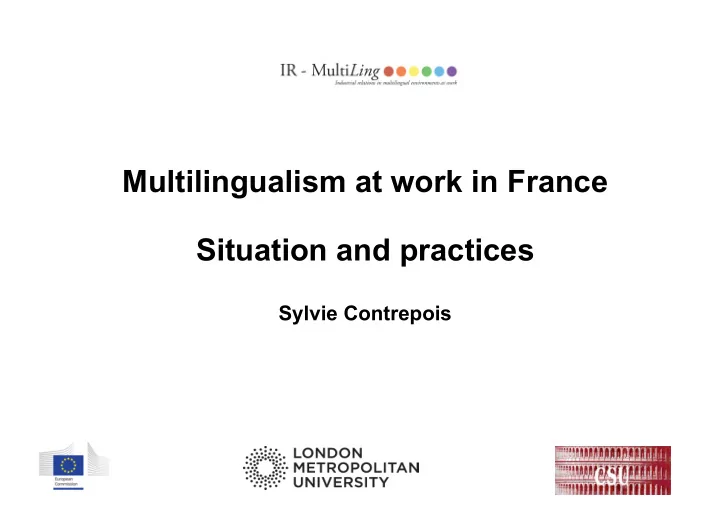

Multilingualism at work in France Situation and practices Sylvie Contrepois
IMMIGRATION & LINGUISTIC DIVERSITY: DATA AND TRENDS
100 years of labour immigration
Immigrant population today • 2013: 5.8 million migrants (8.8 % of the whole population) and 6,7 millions descendants of migrants. • 43% are from Africa (mainly Maghreb) , 37% are EU citizens (Portugal, Italy, Spain), 14% are from Asia (Turkey). • In 2011, 2.7 million immigrants and 2.5 million descendants of immigrants – 20 % of the workforce in total - were present in the French labour market, nearly two-thirds from non-EU countries.
Linguistic diversity • About 400 different languages spoken (including 75 regional languages). • Languages most frequently spoken beyond French: dialectal Arabic (3-4 millions speakers); Creoles and Berber (2 millions); Alsatian (548000); Occitant (526000); Breton (304 000); Oil language (204 000) (INED). • Languages spoken vary according to generations (Arabic is more frequent amongst young people) and according to regions (languages of immigration most frequent in metropoles).
LANGUAGES AT WORK: LEGISLATION AND ISSUES
National legal frame 1992 French as official language (constitution, art • 2) • 1994 Act of August 4 (Toubon Law) states that the French language "is the language of education, labour, trade and public services. It is the key link between the States comprising the Francophone community "(Article 1). • 2001: Recognition of languages of France (DGLFLF). • 2008 The regional languages are recognized by the constitution as part of the nation's heritage (art 75-1).
Linguistic rights in labour law • 3 main sources (Priestley, 2015): - The national legal framework (Article 2 Constitution and Toubon Law) on the use of the French language; - Labour Law (Articles related to job adverts, work contract ...) - Business law: principle of economic freedom. • Extreme weakness of conventional rights: non-existent in the national and sector agreements; marginally present in large companies.
Use of foreign languages • Information and training related to health at work must take account "of the language, spoken or read by the worker ' (art. R. 4141-5 Code Trav). • A foreign worker may request a translation of his/her employment contract in his/her language. Only this version can be opposed to him/her (art. L1221-3 Code Trav). • The working documents received from abroad or designed for foreign countries may not be in French (art. L. 1321-6 Code Trav). • Cass Soc 12 Juin 2012: in aeronautics the use of English is required for security reasons.
A growing use of English • One employee out of 4 must speak or write in another language, usually English (CEE, 2006); • Some trades particularly dominated by English: IT, finance, aerospace electronics, pharmaceuticals, hotels (Truchot, 2016); • This growing importance of English in business is perceived as a stressor and a factor of degradation of working conditions (CGC, 2012).
LESSONS FROM CASE STUDIES
The fieldwork in France Fieldwork preparation : interviews with experts (6) ; workshops organised by ministry of Culture and Association des managers de la diversité. Case studies : cleaning sector, health sector, Undocumented workers surgery. Complementary data in construction and temporary agencies.
Cleaning sector Sector with high economic growth (almost 500 000 employees in 2012); Multinationals operating as subcontractors. 90 % of labour force employed on low qualified jobs Women: 67 %; foreign nationals: 29% High level of precariousness due to triangular relationships. Fieldwork in a large aerospace and in a undocumented workers TU surgery.
Cleaning sector 2 Company language: French. CA: specific provisions in terms of language for health & safety training in ligne with legislation. Many languages spoken informally at work – tolerated since they improve productivity but not acknowledged. Language training: 5 % of total training. Beyond language barriers, workers isolation is an obstacle to their unionisation and their integration into trade unions.
Health sector (1) • Interviews conducted 1) in a regional hospital in the Paris region; 2) in an occupational health service of a great research centre and 3) in a health centre. • Contact persons: secretary, nurse, physician - French nationality.
Health sector (2) • Working language: French. The use of foreign languages among staff is not well tolerated. • Patients from all backgrounds. Language issues managed via lists of personnel speaking other languages; interpreter services; English-language medical dictionary. • Language training (English) and cultural training arranged on working time. • The problems with the language barrier are never addressed by the unions.
Undocumented workers’ trade union surgery (1) Interviews in a French confederation strongly • involved in the strikes of undocumented workers that led to the regularization of over 7,000 illegal workers. Surgery established in 2014 to 1) ensure the • proper application of the new decrees obtained 2) organize these workers and combating social dumping. About 70 to 80 new cases identified each week. • Treatment of cases in several stages: first • contact, work throughout the case.
Undocumented workers’ trade union surgery (2) • French is the main language used in the surgery (TU officials are French); • Some members of foreign nationality were included for their language skills: English, Bambara, Peul, Chinese. • Some forms and leaflets in foreign languages. • The language barrier remains a major obstacle in the treatment of regularization files, due to the complexity of situations. Could the surgery foster the integration of immigrant workers in the confederation?
Provisional conclusions Linguistic labour legislation appears not well respected, both as regards the use of English than migrant workers rights. Employees plutilinguism is hardly recognized. Confirmation of observation by Florence Mourlhon Dallies (2008) and Jette Milberg Petersen (2014). An invisible process of racial and social discrimination is exercised throught the type of languages spoken and the level of command of the dominant language.
Recommend
More recommend